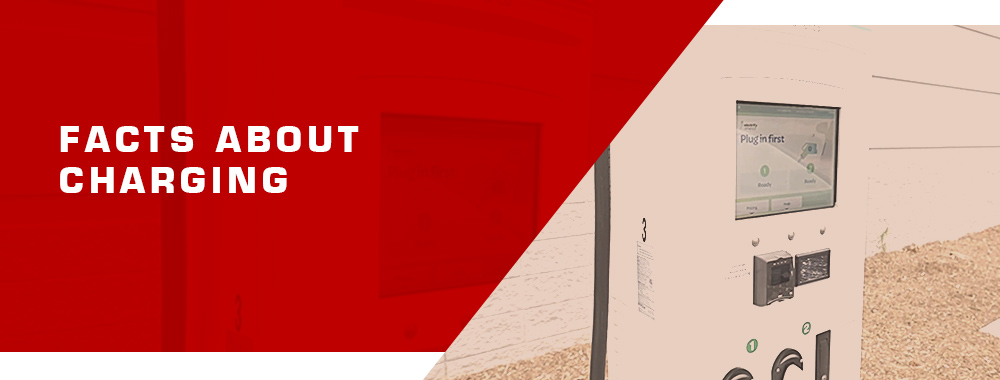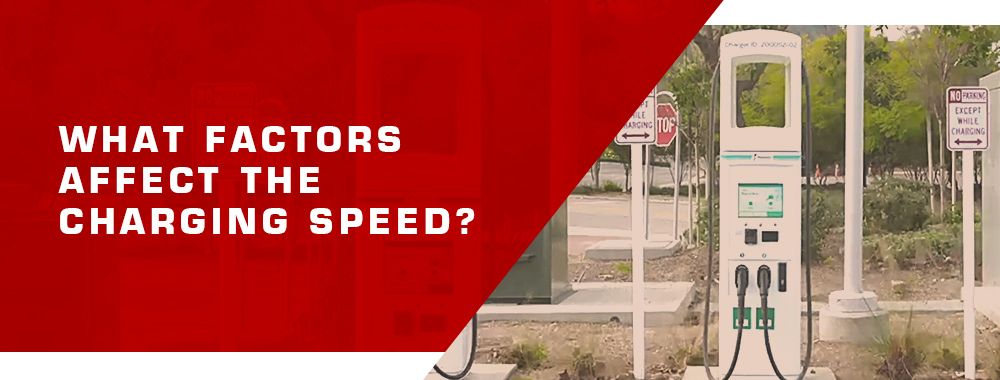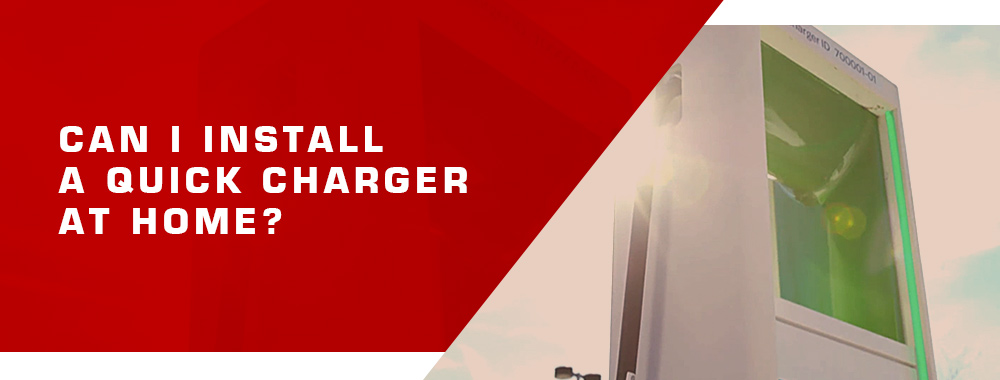How long does it take to charge an electric car from 0 to 100%?
There is no definite answer to this question. It can take anywhere from 30 minutes to a day to charge the car battery to a full charge. It all depends on what type of charging station is used (home EVSE or Network). Battery capacity also directly affects the charging time.
Experts believe that by 2025 the share of electric cars in the U.S. will reach 9%. That’s much higher than it is now. More public stations will be needed, and their number will also increase.

- A normal electric car (60 kWh battery) requires just under 8 hours to charge from an empty battery to a full charge with a home EVSE 7 kW (AC). Read how to choose the best charger in our review.
- Most drivers recharge rather than wait until the battery is fully charged.
- For many electric vehicles, you can extend the range to 100 miles in ~35 minutes with a 50 kW Quick Charger.
- The larger your car’s battery and the slower the charging station, the longer it takes to fully charge.
Charging with renewable energy sources is increasingly in demand. Charging with solar energy is trending.
Which electric car charges the fastest?
The fastest charging electric car is the Lucid Air. In one minute, the battery reaches enough charge to travel about 20 miles. The calculation is for charging at a Tier 3 station. The top five also include the Tesla Model S and, for example, the Porsche Taycan.
Most of the cars on this list are luxury sports cars—fast electric cars with a price tag of more than $70,000. But the humble Nissan Leaf can almost keep up with them when it comes to charging.
Thanks to its relatively lightweight, the Leaf gets more range from a smaller battery, allowing it to compete with more expensive electric cars.
These cars will not charge at a constant rate, and each has a different size battery, so miles per minute will not tell you how long it takes each car to reach a full charge. But miles per minute [12] is a handy designation to help show you what you would get if you bought any of these cars.

There are 5 main factors that affect the time it takes to charge an electric car.
- Battery size: The larger your car’s battery capacity (measured in kWh), the longer it will take to charge.
- Battery status (discharged or full): If you are charging a discharged battery, it will take longer to charge than if you are charging at 50%.
- Maximum vehicle charging speed: The vehicle battery can only be charged at the maximum charging speed that the vehicle can accept. For example. if the maximum charging speed of your car is 7 kW, you will not be able to charge faster using a 22 kW charging point.
- EVSE maximum charging speed: The time required to charge will also be limited by the maximum charging speed of the charging station you are using. For example, even if your vehicle can charge 11 kW, it will only charge 7 kW at the 7 kW charging point.
- Environmental factors: Lower ambient temperatures can slightly increase charging times, especially when using fast charging. Lower temperatures also mean cars are less efficient, so fewer miles are added for each charge.
Our team of experts is here to help you find an EV charger for Nissan Leaf. We have all the pros and cons listed so that you can make an informed decision about what’s best for your car, wallet, and lifestyle. If you still need more information on electric cars or chargers before making a commitment, head over to our next blog post with even more details!
Which charging station is known as a fast charging station?
- Tier 1 chargers are the slowest, but they are the easiest to plug in. Tier 1 chargers are often called “continuous chargers” because they transfer power very slowly. Estimate about 3 miles of range per hour after plugging in.
- Level 2 chargers [13] are what every electric car owner needs. Think about charging at about 20-30 miles per hour, although there are a few factors that hold that back.
- It is worth looking at the Level 3 DC fast chargers available on public networks [22]. They can deliver up to 350 kW – although 50-150 kW seems more common now – if your electric car supports it. This means much faster charging, about 60-120 miles in 10-20 minutes, depending on the charger and the car.
- Tesla Supercharger network. There are actually two main types of supercharger.
The lesser-known, Tesla Destination Charging, is actually Level 2 chargers with a special Tesla plug.
More popular is the fast charger, which can increase the range to 200 miles in 15 minutes. This speed, as with any fast charger, can vary depending on the Tesla model, the specific charger, and conditions such as the current battery level.
Portable and stationary electric car chargers are becoming more popular every day. We’ve compared the Chargepoint models with other brands to help you make an informed decision about which one is best for you. With a stable, reliable product like the Chargepoint EV charger, you can be sure that your electric car will always be ready to go when you need it. Be sure to read our next article for more information on the different types of electric car chargers available to you.
How fast does the Tesla supercharger work?
Superchargers can boost range to 200 miles in as little as 15 minutes. Because charging over 80 percent is rarely required, stops are usually short and convenient. With an extensive fast-charging network, automatic battery prepping and exceptional range for every Tesla, you’ll spend even more time on the road.

Faster (up to 22 kW) three-phase circuits are available if your AC home power grid allows it. Read our review of the best charging stations for your home.
That said, the idea of fast direct current (DC) charging is almost exclusively reserved for public charging stations – at least for now. There, normal speeds of 50 or 100 kW are common, and values up to 350 kW are possible.
Finally installed a Level 2 charger at home. It’s a game changer! No more waiting hours at public stations. Although the installation cost a bit, the convenience is worth every penny. Anyone else made the switch? How’s your experience?
I made the switch a few months ago. Totally agree on the convenience factor. It’s like charging your phone – plug in overnight and you’re set for the day. The initial cost stings, but long-term savings on fuel and time are unbeatable.
I’m planning a road trip in my EV but worried about finding enough fast chargers along the route. Any tips on planning for long-distance EV travel? Do apps work well for locating chargers?
I’ve done a few EV road trips. Key is planning your stops around charging stations. There are great apps like PlugShare that show you charger locations and availability. Always have a backup charger in mind, just in case.
I’m intrigued by the prospect of solar-powered EV charging. Imagine the sustainability! But is it currently feasible? Anyone explored or set up a solar charging system?
I set up a small solar array to power my home charger. It’s not 100% efficient, but on sunny days, it feels great knowing I’m driving on solar power. The setup was a bit complex but definitely feasible.
Just read an article about the impact of cold weather on EV batteries. It’s a bit concerning. Living in a colder region, should I be worried about significant range reduction in winter?
Living in Canada, I do notice a drop in range during winter, but it’s manageable. Preconditioning the battery and cabin helps. Also, parking indoors when possible makes a big difference.
I’m amazed at how EV charging technology is evolving. I remember when Level 1 charging was the norm, and now we’re talking about ultra-fast charging. It’s exciting to see this progress. What’s the fastest charging experience anyone’s had?
Just a heads-up: I saw a safety recall notice for a popular EV model due to charging port issues. Check your model and stay safe. Better to be proactive with these things. Here’s the link to the manufacturer’s recall page.
Thanks for sharing. I checked and thankfully, my car isn’t affected. But it’s a good reminder to stay informed about these safety recalls. Always better to be safe than sorry.